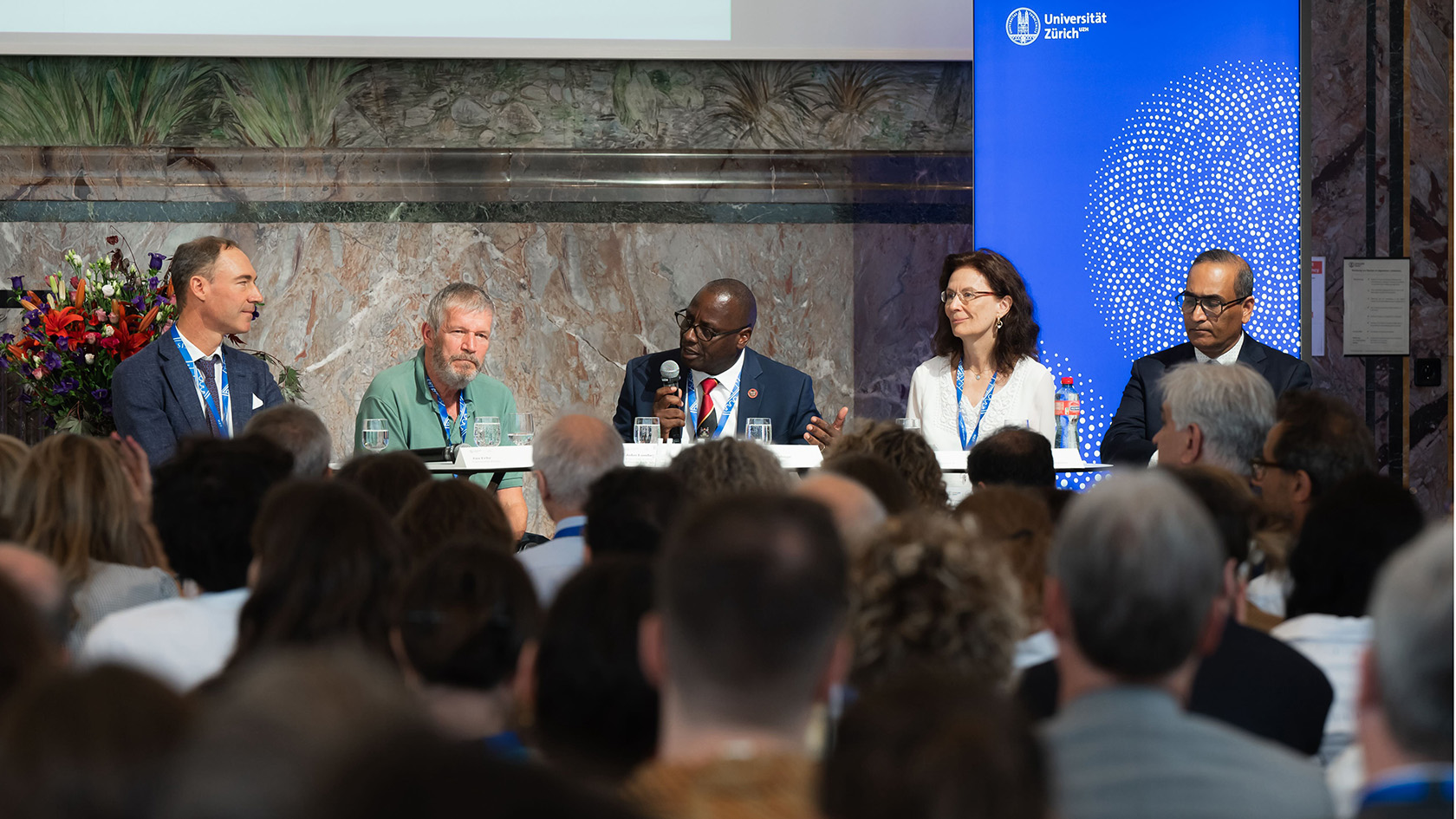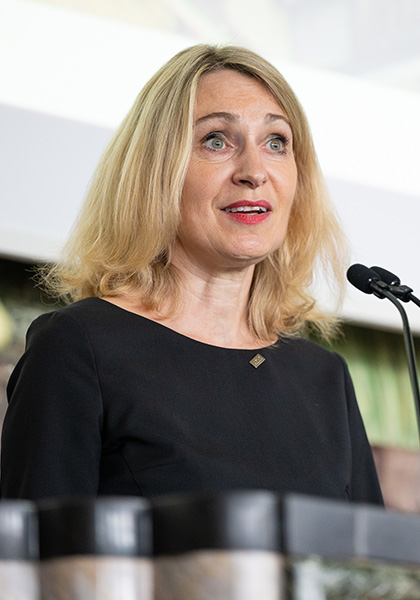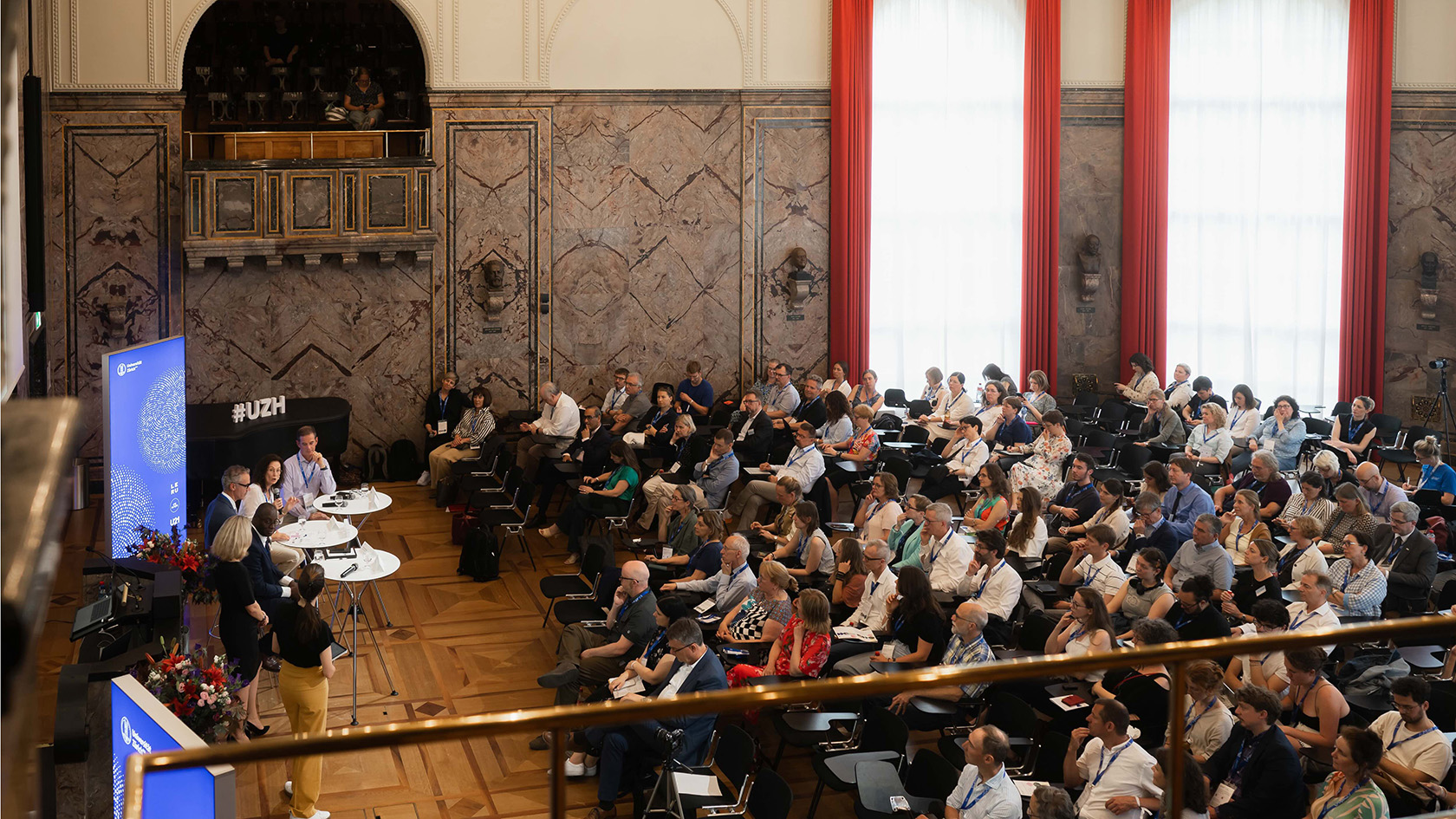“Una Europa acts as a catalyst for interdisciplinarity”

Elisabeth Stark, you have just said goodbye to the 300 or so participants who attended the UZH-hosted Una Europa General Assembly. How did the event go, are you happy?
Elisabeth Stark: I’m very happy with how the General Assembly unfolded, how it was organized and the atmosphere we had. My sincere thanks go to Global Affairs for the excellent organization. The events, which were attended by researchers, students and members of the universities’ management bodies and central administration, were marked by open dialogue, with participants sharing their many ideas and opinions. I believe these two-and-a-half days were highly productive. We now need to process the insights we’ve gained, sort through the suggestions and ideas and focus on implementation.
This is the first General Assembly of Una Europa to be organized by UZH. You invested a lot of time and effort in putting together an interesting scientific and cultural program. Why is Una Europa important for the university?
Elisabeth Stark: The alliance enables us to forge close partnerships and collaborations with 10 like-minded universities across Europe. This is very important for us because Switzerland is not a part of the European Union, and we’re currently not an equal partner in the EU’s research programs either. Una Europa gives us indirect access to Horizon Europe and Erasmus+ programs that we would otherwise not be able to take part in. Our Una Europa partner universities are also well-connected advocates for Switzerland’s re-association with Horizon Europe and Erasmus+, which is highly relevant this year.
But of course, the alliance is also important on the level of content. Una Europa’s Focus Areas perfectly align with our own strategic orientation in research, innovation and teaching. The six areas, all interdisciplinary, are Cultural Heritage, Data Science and Artificial Intelligence, Europe and the World, Future Materials, One Health and Sustainability. As a comprehensive university, we’re in a perfect position to contribute.

The underlying theme of the General Assembly was One Earth, One Future. Can you elaborate on this?
Elisabeth Stark: The theme focused on the idea of togetherness and unity that we’re pursuing in our research and visions together with Una Europa. We all share the same planet, and many of UZH’s research focuses explicitly address this. The theme was of course also a nod to the topic of One Health, which was at the heart of this General Assembly and is one of UZH’s strategic priorities. Last year, for example, we were the first university in Europe to establish a One Health Institute.
This allowed UZH to showcase its expertise in the area. How was this perceived by the guests, what feedback did you receive?
Elisabeth Stark: We received a lot of positive feedback about our One Health Institute. I would like to quote Andrea S. Winkler, an expert from the University of Oslo and the Technical University of Munich, who congratulated us at the Una Europa Talk on One Health and was also a little envious that we had created such an institute. It’s still being developed and will continue to grow. But it shows our commitment as well as our diverse activities, for example our collaboration with Makerere University in Uganda. Thanks to Una Europa, we’re pooling additional expertise in the area of One Health, which we now want to leverage in joint projects. Bruno González Zorn from the Complutense University of Madrid, which is also a member of Una Europa, will be speaking at the upcoming One World One Health conference in South Africa about the relevance of research alliances when it comes to successfully tackling such global issues. A joint Master’s program of the Una Europa Alliance for One Health is also being discussed. These activities illustrate very well how Una Europa can act as a catalyst for our own efforts to achieve genuine interdisciplinarity.

Thanks to Una Europa, we’re pooling additional expertise in the area of One Health, which we now want to leverage in joint projects.
One Health isn’t the only Una Europa Focus Areas that’s interdisciplinary. Is interdisciplinary collaboration a hallmark of the alliance?
Elisabeth Stark: Absolutely. The alliance definitely boosts interdisciplinary cooperation between universities, both internally and externally. In my view, this is an absolute necessity given the comprehensive research mandate given to us by society. We invest a lot of energy in promoting cooperation between researchers and developing cross-faculty structures.
The six Focus Areas of Una Europa were all deliberately designed to be interdisciplinary and bring together experts from different fields and disciplines from all 11 partner universities. Together, these groups – organized in self-steering committees – aim to design innovative teaching formats and find new ways for collaborative research. These structures form an ideal basis for researchers at UZH to work together in an interdisciplinary manner on the crucial societal challenges of our day with peers from 10 other leading European universities.
You have represented UZH on the Board of Directors of Una Europa since the beginning of the year. Can you give us an assessment of your experience so far?
Elisabeth Stark: The experience with Una Europa has been overwhelmingly positive. The alliance is all about lively and valuable exchange. Members communicate a great deal and benefit from one other. The remarkable momentum is also impressive. In just five years since it was founded in 2019, Una Europa has already put together two Bachelor’s programs, a joint doctoral program and various summer and winter schools, among other things. But there is still room for improvement: the background documents are sometimes very extensive and detailed, and they entail a considerable amount of work. I’d like to see some more efficiency in this area.
Where is Una Europa headed?
Elisabeth Stark: Previous activities focused heavily on teaching, with the Master’s and Bachelor’s programs, but now early-career researchers are getting a little more attention, especially at PhD level. We’re also stepping up research collaborations, particularly in Africa and Latin America. As Vice President Research and a Romance Studies scholar, I welcome this, although teaching will continue to play an important role. In Data Science and Artificial Intelligence, for example, UZH has just taken the lead for a pilot project on inter-university module exchange.
When and where will the next General Assembly take place?
Elisabeth Stark: The next General Assembly will be held this November at the University of Bologna in Italy, and the one after that is planned to take place at Jagiellonian University in Krakow. Having two general assemblies per year sets quite a high pace, but this makes sense for an organization that’s still young. UZH will host the assembly again in about six years’ time.
